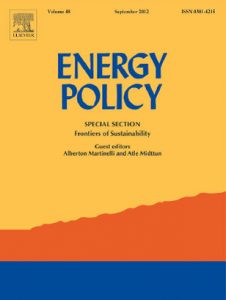The final paper of my dissertation has just been accepted for publication:
 This paper analyses the field of innovation studies regarding barriers to low-carbon innovation and consequences for finance (investment and divestment) and contributes to a more holistic understanding of the underlying mechanisms. A combination of technological barriers combined with economic barriers, institutional and political barriers contribute to sub-optimal low-carbon investment all along the innovation cycle. Policy makers need to take a systemic approach to enable the redirection of diverse private financial sources. Instruments range from cutting ‘dirty’ (R&D) subsidies and support for clean technology innovation and diffusion, levelling the institutional playing field and making risks of high-carbon and low-carbon technologies transparent to providing a consistent but adaptive long-term transition strategy. This would allow financiers to gradually shift their investments away from high-carbon mainstream markets and scale low-carbon technology niche-markets. However financiers also need to sharpen their competencies with regard to new clean technologies and markets.
This paper analyses the field of innovation studies regarding barriers to low-carbon innovation and consequences for finance (investment and divestment) and contributes to a more holistic understanding of the underlying mechanisms. A combination of technological barriers combined with economic barriers, institutional and political barriers contribute to sub-optimal low-carbon investment all along the innovation cycle. Policy makers need to take a systemic approach to enable the redirection of diverse private financial sources. Instruments range from cutting ‘dirty’ (R&D) subsidies and support for clean technology innovation and diffusion, levelling the institutional playing field and making risks of high-carbon and low-carbon technologies transparent to providing a consistent but adaptive long-term transition strategy. This would allow financiers to gradually shift their investments away from high-carbon mainstream markets and scale low-carbon technology niche-markets. However financiers also need to sharpen their competencies with regard to new clean technologies and markets.





